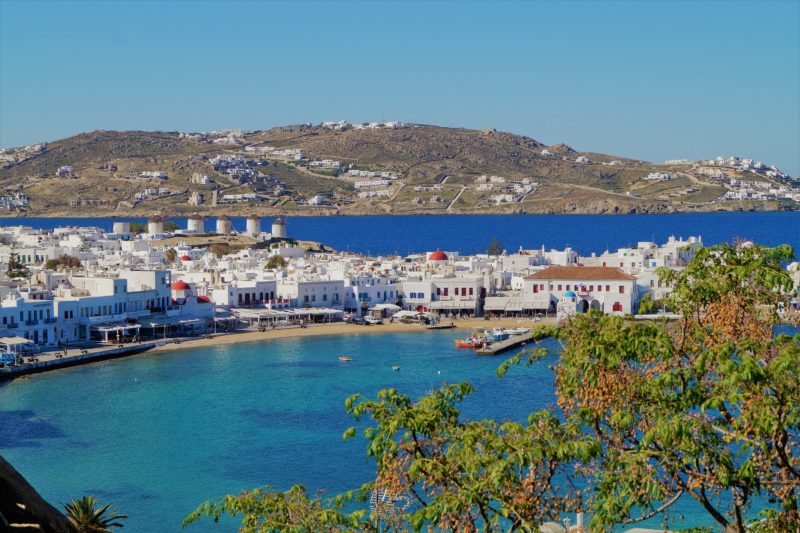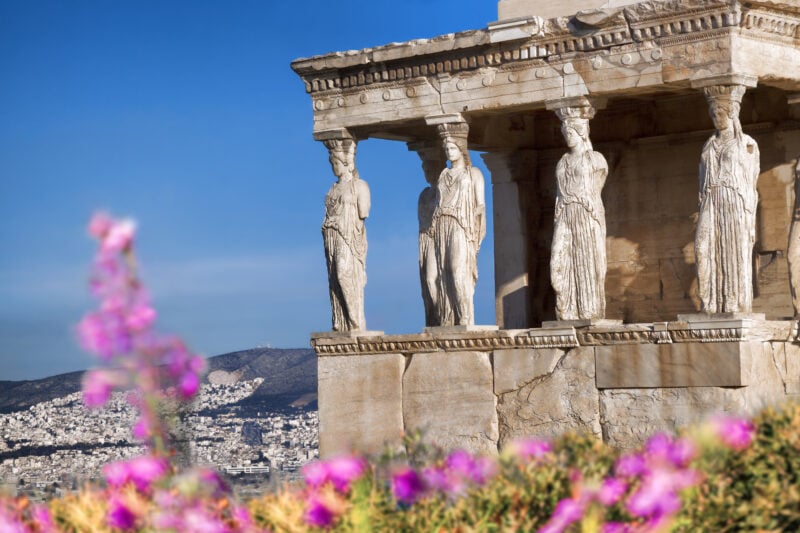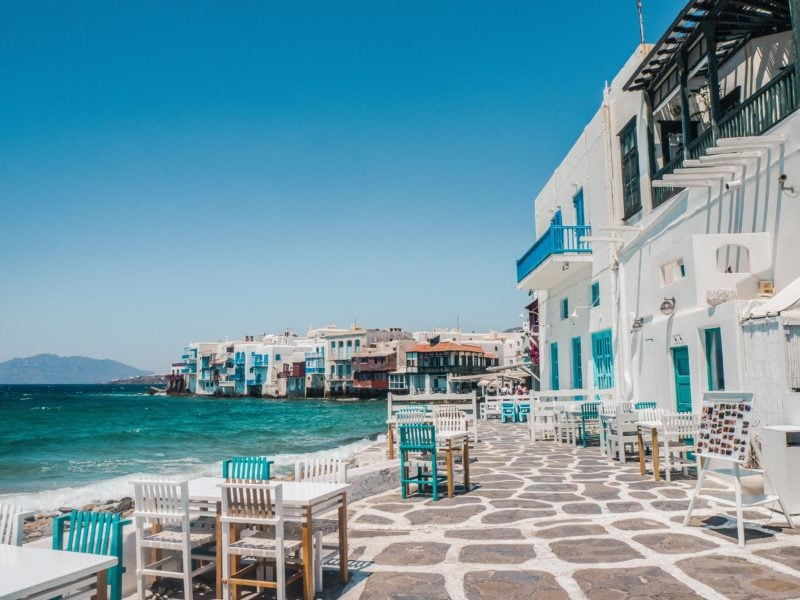Some posts on this site contain affiliate links. If you book or buy something through these links, I earn a small commission (at no extra cost to you). Take a look at my privacy policy for more information.

Greece beckons travellers with sun-drenched islands, ancient ruins, and Mediterranean charm that’s impossible to resist. But what starts as a vacation often becomes something more: a deep connection that makes you wonder about staying longer.
This comprehensive guide covers everything from must-visit destinations to practical considerations for extended stays, including recent opportunities for those considering Greece as a long-term base.
Why Greece Should Top Your Travel List
Greece offers an irresistible combination of history, natural beauty, and lifestyle that few destinations can match. The country boasts over 6,000 islands, though only 200 are inhabited, creating endless opportunities for exploration.
The Mediterranean climate provides over 250 days of sunshine annually, making it perfect for year-round travel. Summer temperatures hover around 25-30°C (77-86°F), while winters remain mild, especially in coastal areas.
Beyond the weather, Greece’s rich cultural heritage spans millennia. From the Acropolis in Athens to the monasteries of Meteora, historical sites dot the landscape at every turn.
Essential Greek Destinations for First-Time Visitors
Athens: Where Ancient Meets Modern

Athens serves as the perfect introduction to Greek culture and history. The city seamlessly blends archaeological wonders with contemporary urban life.
The Acropolis dominates the cityscape, housing the iconic Parthenon and offering panoramic views. Plan at least half a day here, arriving early to avoid crowds and heat.
The Acropolis Museum provides context for the ancient structures, while the nearby Plaka neighbourhood offers traditional tavernas and souvenir shopping.
Modern Athens surprises visitors with its vibrant food scene, rooftop bars, and cultural venues. The National Archaeological Museum houses treasures from across Greece’s ancient civilisations.
Santorini: Postcard-Perfect Romance
Santorini’s dramatic cliffs and sunset views make it Greece’s most photographed destination. The volcanic island’s unique landscape creates an otherworldly atmosphere.
Oia village provides the classic Greek island experience with white-washed buildings cascading down cliffsides. Book accommodations well in advance, especially for summer visits.
Wine enthusiasts shouldn’t miss the island’s unique volcanic soil wines. Assyrtiko grapes produce crisp, mineral-rich whites that pair perfectly with fresh seafood.
Red Beach and Kamari Beach offer different coastal experiences, from dramatic red cliffs to black volcanic sand.
Mykonos: Party Paradise and Cultural Gem

Mykonos balances world-famous nightlife with charming traditional architecture. The island attracts jet-setters and culture lovers alike.
Mykonos Town’s narrow streets hide boutique shops, art galleries, and waterfront restaurants. The iconic windmills provide perfect photo opportunities, especially at sunset.
Paradise Beach and Super Paradise Beach cater to the party crowd, while Platis Gialos offers family-friendly swimming and water sports.
Day trips to nearby Delos reveal one of Greece’s most important archaeological sites, believed to be Apollo’s birthplace.
Hidden Gems Beyond the Tourist Trail
Crete: Greece’s Largest Island Adventure
Crete offers diverse experiences from mountain villages to pristine beaches. The island’s size means multiple visits barely scratch the surface.
The Minoan Palace of Knossos near Heraklion reveals Europe’s earliest advanced civilisation. Chania’s Venetian harbour combines architectural beauty with excellent dining.
Samaria Gorge provides one of Europe’s finest hiking experiences, stretching 16 kilometres through dramatic landscapes. The trek requires good fitness and takes 4-7 hours.
Balos Lagoon’s turquoise waters and pink sand beaches create Caribbean-like scenery in the Mediterranean.
Naxos: Authentic Greek Island Life
Naxos delivers authentic Greek culture without overwhelming tourist crowds. The island’s agricultural heritage means exceptional local produce and traditional recipes.
Portara, a massive marble gate, frames spectacular sunsets from the harbour. The Old Town’s Venetian architecture and narrow alleys invite hours of exploration.
Mount Zas offers hiking opportunities with panoramic views, while Plaka Beach provides long stretches of golden sand.
Practical Travel Tips for Greece
Best Times to Visit
Timing significantly impacts your Greek experience. Peak season (July-August) brings crowds and high prices but guarantees sunshine and vibrant nightlife.
Shoulder seasons (May-June, September-October) offer ideal weather with fewer crowds. Many businesses close during winter on smaller islands.
Spring brings wildflowers and mild temperatures perfect for hiking and sightseeing. Fall extends the swimming season, while also providing comfortable walking weather.
Getting Around the Islands
Ferry connections link most inhabited islands, though schedules vary seasonally. High-speed ferries reduce travel time but cost more than conventional services.
Island hopping requires careful planning, especially during shoulder seasons when services are reduced. Blue Star Ferries and SeaJets operate major routes.
Domestic flights connect Athens to major islands quickly. Olympic Air and Aegean Airlines serve most destinations, though prices spike in summer.
Car rentals provide island exploration freedom but require confidence with narrow roads and aggressive local driving styles.
Greek Cuisine and Dining Culture
Greek food extends far beyond tourist-trap tavernas serving predictable menus. Regional specialities vary significantly across the country.
Mezze culture encourages sharing multiple small dishes. Order variety to experience different flavours – dolmades, spanakopita, and fresh seafood make excellent choices.
Local wines deserve attention, particularly from Santorini, Nemea, and Macedonia regions. The Greek craft beer scene has exploded recently with innovative breweries.
Dining typically starts late; lunch around 2-3 PM, dinner after 9 PM. Embrace the leisurely pace and social atmosphere.
Considering Greece for Longer Stays
Many visitors find Greece’s appeal extends beyond vacation length. The relaxed lifestyle, favourable climate, and rich culture attract those seeking lifestyle changes.
Recent policy changes have opened new pathways for extended stays. The Greek Golden Visa program allows non-EU citizens to obtain Greek residency by investing in real estate, providing access to European travel and potential long-term benefits.
Investment thresholds vary by location: €800,000 in high-demand areas like Athens and Santorini, €400,000 in other regions, and €250,000 for property restoration projects. These investments often appreciate while providing residency benefits.
For those considering this option, consulting with specialists like Global Residence Index provides valuable guidance on property selection, legal requirements, and application processes. Their expertise helps navigate complex regulations while maximising investment potential.
Cultural Experiences Not to Miss
Religious Festivals and Celebrations
Greek Orthodox festivals provide insight into local traditions and community life. Easter celebrations are particularly elaborate, with midnight services and feast preparations.
Local panigiri (religious festivals) occur throughout the summer, featuring traditional music, dancing, and communal meals. These events welcome visitors and offer authentic cultural exchanges.
Traditional Music and Dance
Bouzouki music and traditional dances remain integral to Greek culture. Many tavernas offer live music, especially during tourist season.
Learning basic dance steps enhances social experiences. Greeks warmly welcome participation in circle dances during celebrations.
Budget Planning for Your Greek Adventure
Greece offers options for various budget levels, from backpacker hostels to luxury resorts. Smart planning stretches budgets significantly.
Accommodation costs vary dramatically by season and location. Booking shoulder season visits reduces expenses while maintaining pleasant weather.
Eating at local taverns costs a fraction of tourist restaurant prices. Markets provide fresh produce for self-catering options.
Transportation represents a major expense category. Ferry passes and advance booking reduce island-hopping costs.
Planning Your Perfect Greek Itinerary
Successful Greek trips balance must-see highlights with relaxation time. Over-scheduling prevents appreciation of Greece’s leisurely pace.
First-time visitors benefit from combining Athens with 2-3 islands at most. This allows deeper exploration rather than superficial touring.
Consider basing yourself in one location for extended periods rather than constant movement. Greece rewards slow travel with deeper cultural connections.
Weather, ferry schedules, and seasonal business closures affect itinerary planning. Flexibility prevents disappointment when plans require adjustment.
Greece captures hearts with its perfect blend of ancient wonders and modern pleasures. Whether planning a short vacation or considering longer-term possibilities, the country offers experiences that linger long after departure. The key lies in embracing Greek time, savouring each moment, and allowing the country’s magic to work its spell.

